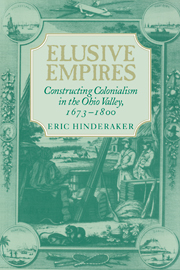PART THREE - EMPIRE OF LIBERTY
Published online by Cambridge University Press: 16 February 2010
Summary
To construct an American empire of liberty, it was first necessary to stand European imperial principles on their head. In both the French and British empires, landed development required central control; without that, the benefits of empire would not flow toward its center. If imperial elites were to gain anything by colonization, the process had to be carefully governed. Thus imperial government came to function as a restraining force on the activities of colonists; if settlers pressed onto Indian lands, colonial officials were expected to act as mediators. It was at least theoretically within the power of government to restrain opportunistic colonists, to legitimize Indian land claims in English law, and to aid Indian leaders by taking their concerns and complaints seriously. However imperfect these operations were in fact, in principle the weight of imperial authority supported efforts to ensure order, create legitimate boundaries, and protect the established interests of both Native and European Americans along the boundaries of settlement.
It was precisely the immensity of this task that defeated the British empire in the Ohio Valley. Centralized control of policy was difficult enough to attain for the seaboard colonies; in the continental interior the complexities were still more baffling. The result, as we have seen, was withdrawal and collapse. An unprecedented burst of immigration in these same years compounded the effects of that collapse.
- Type
- Chapter
- Information
- Elusive EmpiresConstructing Colonialism in the Ohio Valley, 1673–1800, pp. 185 - 186Publisher: Cambridge University PressPrint publication year: 1997



